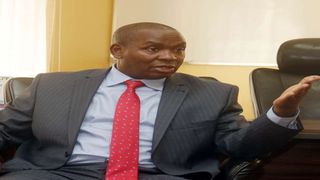
Laikipia Governor Ndiritu Muriithi.
| File | Nation Media GroupBusiness
Premium
Counties get greenlight to borrow loans of up to Sh60bn
What you need to know:
- Previously, counties could borrow cash from banks for recurrent expenditure, but there was no provision for long-term development borrowing.
Laikipia is set to be the first county to borrow for development as it is scheduled to hold a public launch of its Credit Rating Report today morning in readiness for floating a sovereign bond.
County governments now have the greenlight to borrow up to Sh60 billion for development projects in a deal reached between the Intergovernmental Budget and Economic Council (IBEC) and the National Treasury.
Council of Governors Finance Committee Chairman Ndiritu Muriithi in an interview said counties can borrow up to 20 per cent of their last audited total revenue. The Sh60 billion upper limit is based on the Financial Year 2018/19 audited revenues.
Revenue is, for purposes of setting the borrowing ceiling, defined as the share that counties receive from the Treasury and own-generated cash that the regional governments raise from fees such as licence and parking charges.
“The money can be used for capital projects as anticipated in the Constitution and Public Finance Management Act. Importantly, counties can issue securities such as bonds,” said Mr Muriithi, who is also the Laikipia governor.
Previously, counties could borrow cash from banks for recurrent expenditure, but there was no provision for long-term development borrowing.
Sh60 billion debt
The proposal for counties to borrow has been previously floated in IBEC meetings and accepted but, counties never got the clearance to proceed until now.
IBEC, which is chaired by Deputy President William Ruto and includes governors and Treasury Cabinet Secretary Ukur Yattani, approved the Sh60 billion debt provision during a meeting two weeks ago that also increased counties’ equitable shareable revenue by Sh44 billion to Sh409.88 billion in the next financial year.
Laikipia is set to be the first county to borrow for development as it is scheduled to hold a public launch of its Credit Rating Report today morning in readiness for floating a sovereign bond.
The self-funded credit rating has been undertaken by GCR Ratings and compliments the county government of Laikipia’s strategy to raise funds from the private sector to support projects like water supply, smart towns initiative among others.
The go-ahead for counties to borrow will, however, also raise concerns over their capacity to absorb money and misuse by regions. While regional governments in countries like the US have used the borrowing provision to grow and build infrastructure for water and education, others like Argentina’s plunged the country into a debt crisis that tanked the economy when they were unable to repay.
Mr Muriithi, however, says the provision for counties’ borrowing has strict legal guidelines and provisions. The Treasury has to ensure counties meet the guidelines before they go to the market for loans.
Feasibility studies
“For instance, it requires counties to undertake feasibility studies to find out if the projects have any economic or social gains or returns. Then, their ability to conduct timely procurement to ensure cash borrowed can be absorbed. The pricing is likely going to be uniform because all county borrowing has Treasury guarantee. In the future, we may see pricing based on perceived risk of the sub-sovereigns,” says Mr Muriithi.
The proposal comes at a time when, nationally, repayment of public debt is for the first time set to cross the Sh1 trillion mark from July, underlining the burden of mounting government borrowing. The Treasury in February disclosures to Parliament shows that it will pay Sh1.023 trillion for loans in the year starting July, making it the single-largest expenditure and more than double the Sh435.7 billion that taxpayers paid for debt four years ago.
MPs have also raised issues on public debt and called on the National Treasury to be realistic in its budget estimates so as to save the country from further sinking into unsustainable debts.
The caucus chaired by Kiambu Town MP Jude Njomo said there is an urgent need to initiate reforms in the budgeting process in order to enhance fiscal discipline and control runaway national debt.
Mr Njomo was speaking during a meeting with Parliament Budget Office, the Kenya Institute for Public Policy Research and Analysis, Commission on Revenue Allocation, Okoa Uchumi Coalition, and Westminster Consulting in Mombasa.
Additional reporting by Samuel Owino





